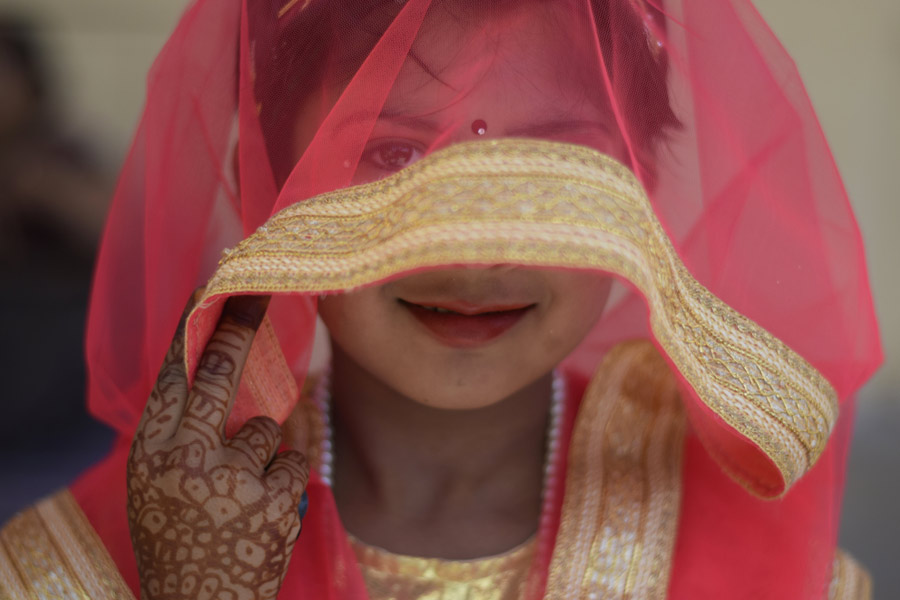There was little disbelief among students of a government school here when two of their mates came bearing the signs of a newlywed bride. Teachers suspected the obvious, but chose to overlook.
Rani and Pinki (name changed), aged 15 and 16, were married at their home with full fanfare in Hanuman ji Ka Jhopda village on July 15, two days before the annual wedding season would expire.
The two sisters, belonging to an Other Backward Caste, study in class 9 and 10 in a government school in Hindoli area of Bundi district.
Years after the rule of law was enshrined in our polity, child marriages continue to take place in villages of Rajasthan.
For instance, it is not uncommon here to witness the husband or some member of the in-laws' family dropping the little bride on a motorbike to school.
"Being the elder aunt (tai) of the girls, I did the 'kanyadaan' of Rani, one of the two child-brides," Rukamani Bai (name changed), who works as a househelp in Bundi city, told PTI.
Rukamani Bai had taken four days' leave from work to attend the weddings of her two nieces and shopped for gifts worth around Rs 10,000 for them.
One of the teachers of a government school on condition of anonymity said they do notice some girl suddenly one day coming wearing sindoor and colourful bangles, but they can do little about it.
"Sometimes girls in the class are heard whispering about their mate's wedding. The bride usually either shies away or avoids the question by turning her face to the other side," he said.
The teacher said complaining to authorities yields little once the marriage has already happened, and one always risks inviting the locals' wrath who may respond by taking the girl out of school.
When asked about the recent wedding of two sisters, her teachers expressed ignorance but confirmed the two sisters had been absent from school class for quite a few days.
Often, parents in rural belts tend to marry off their younger daughters along with the eldest daughter to save additional expenses of marriage, however, the younger brides are not sent to their in-laws' house until they attain adulthood, according to the people in the area.
Though authorities keep a watch on such marriages, the machinery is not fool-proof, more so, when mainstream politicians subscribe to the view that there's nothing wrong with it.
Some villagers cited the positive aspects of such alliances and even call for an amendment in the Prohibition of Child Marriage Act, 2006.
"Minor couples prefer education and government job for girls and they continue their wards' study in school and college even after child marriage," said one of the villagers.
Bundi district general secretary of BJP's OBC forum Dikshant Soni admitted that child marriage do take place in the villages and demanded modification in the Child Marriage Act.
Soni said parents in rural belts are forced to marry off their girls at an early age due to poverty. He also blamed the trend on "changing environment with food habits" which is leading to "early puberty" among boys and girls.
"Girls and boys tend to get mature early and bring humiliation to parents by eloping with someone else," Soni said.
According to Deputy Director Social Justice and Women Empowerment department Bhairu Prakash Nagar, child marriages often take place on and around Akshya Tritya, also known as Akha Teej and Pipal Purnima, in the region.
When asked about the two marriages in Hindoli village, he said he did not know about them.
Local Deputy Superintendent of Police Ghanshyam Meena denied reports of child marriage in the area.
A few other teachers PTI spoke to revealed that Rani and Pinki were not stray incidents of child marriage.
A teacher revealed that a class 7 girl in Sukhpura village of Hindoli was found to have been engaged to a class 9 boy last year. Another class 7 girl was found to have been married last year. A class 10 girl was married off on March 4 this year to an electric pole maintenance worker.
Two underage girls dropped out of class 12 and chose to live at their in-laws' home after they were married off last year, a teacher revealed.
According to the latest National Family Health Survey-5 (2019-21), 23.3 per cent of women aged 20-24 were married before the age of 18.
Except for the headline, this story has not been edited by The Telegraph Online staff and has been published from a syndicated feed.











